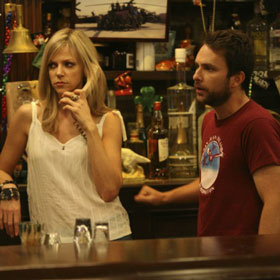It's Always Sunny In Philadelphia – Season Seven

4/5
It’s Always Sunny in Philadelphia is back for its seventh season, and the show is just as depraved and disturbing as ever. Which is a good thing, of course. It’s Always Sunny has created a successful brand of raunchy, dysfunctional, drug-fueled humor that is deliciously uncomfortable, re-creating, in some ways, the effect of trashy talk shows of yore. Everyone likes a good train wreck, and all of us thank the heavens we aren’t anything like the crew at Paddy’s.
The season opener, aptly titled Frank’s Pretty Woman, begins with the gang discussing the merits of having a vicious dog for a Paddy’s mascot. Dee points out that getting bit by a dog in their bar is the type of thing that makes for great memories, emphasizing the show's skewed attitude, backwards logic, and morally corrupt characters. It turns out that Its Always Sunny has become a sort of dark, twisted Seinfeld, a show about socially inept adult-children, the wild and perverse situations they get into and all the selfish means they take to ‘overcome.’
This time around, Frank wants to marry the dirtiest prostitute in Philly, Roxy. The only problem, as Frank says, is that he wants her to stop “bangin’ other guys.” Dee takes it upon herself to turn Roxy around and takes her out boutique shopping in an attempt to de-whoreify her, resulting in a hilarious standoff between a maybe-gay clerk, an expensive leather jacket and a bottle of whiskey. Soon enough though, Dee realizes the perks of being a lady of the night after Roxy introduces her to a dough-slinging, foot-fetishist, Tiger Woods. No, not the Tiger Woods. But you get the point.
Meanwhile, Dennis and a sizable Mac (Rob McElhenney gained fifty pounds in preparation for this season just to have a running gag about his weight; think “Big Mac”) visit a doctor to see who is the healthiest. Dennis, with his “hummingbird” leg exercises, is surprised to learn he’s not in that great of shape, while a gloating Mac, who is “cultivating mass,” learns he has type 2 diabetes (which he pronounces in a his best Wilford Brimley, “dye-a-bet-tus”). Later on, the two have a nearly philosophical discussion about wants, desires, and chimichangas. Dennis expresses his desire for crack while Mac overdoes it with the insulin injection.
There’s plenty more in this episode to keep you wondering about the fate of mankind: Charlie and Frank boiling found denim, Charlie vomiting copious amounts of fake blood on a would-be date, Frank pondering who would leave a full case of good eggs under the bridge, Mac and Dennis breaking in their new Tommy Bahamas shirts, Dee back on crack cocaine, and all of it culminating in a surprise death. When faced with the disposal of a deceased prostitute, the gang decides to forgo police intervention and they drag her lifeless body into the hallway. Of course, they have the decency to place an anonymous call. After all, the gang’s not that heartless, right?
What continues to make It’s Always Sunny stand out from other comedic sitcoms is this exact sort of madness. We enjoy watching people whose morals are more deficient than our own, and we especially like laughing at inappropriate times. Crack addiction is not funny, not in the least. But in Philadelphia it is. And so are dead hookers. The team behind It’s Always Sunny knows that this type of exploitation can be humorous and that deep down it’s what entertainment is all about. They continue to produce a show that you’re embarrassed to watch with your mother, but one that’s too good not to share. It’s plain to see that It’s Always Sunny is a labor of love for the cast and crew. The characters are original and oddly endearing, which begs the question: To what shameless depths have we sunken if we feel any sort of intimacy with these characters? And who cares? Being this wrong never felt so right.
RELATED ARTICLES
Get the most-revealing celebrity conversations with the uInterview podcast!







Leave a comment